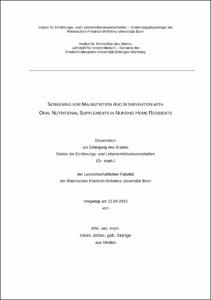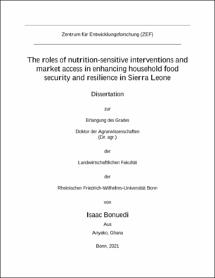Jobse, Inken: Screening for malnutrition and Intervention with oral nutritional supplements in nursing home residents. - Bonn, 2013. - Dissertation, Rheinische Friedrich-Wilhelms-Universität Bonn.
Online-Ausgabe in bonndoc: https://nbn-resolving.org/urn:nbn:de:hbz:5n-34197
Online-Ausgabe in bonndoc: https://nbn-resolving.org/urn:nbn:de:hbz:5n-34197
@phdthesis{handle:20.500.11811/5564,
urn: https://nbn-resolving.org/urn:nbn:de:hbz:5n-34197,
author = {{Inken Jobse}},
title = {Screening for malnutrition and Intervention with oral nutritional supplements in nursing home residents},
school = {Rheinische Friedrich-Wilhelms-Universität Bonn},
year = 2013,
month = dec,
note = {Malnutrition is a common and known problem in the elderly population with serious consequences. The use of oral nutritional supplements as intervention option to improve the nutritional situation has also been investigated in various studies. However, data from the nursing home setting, and especially nutritional intervention studies in this special, often functionally impaired target group, are rare, also with regard to functional outcome. Key part of the present thesis is therefore an intervention trial with oral nutritional supplements (ONS) in six nursing homes in the area of Nuremberg-Fuerth.
First, it was aim to identify all residents with malnutrition or at risk of malnutrition during screening, which revealed a prevalence rate of 64% in all residents included. Furthermore, the application of different markers of nutritional risk allowed the comparison of MNA® (Mini Nutritional Assessment) with single risk markers (low BMI, low food intake, weight loss). It was shown that the MNA enabled broad identification of all residents at nutritional risk, covering 90.4% of subjects presenting one or more single nutritional risk markers. Moreover, the association between nutritional status and functionality was investigated. Impairment of cognition, mood and depression, and in particular severe impairment, was to a higher share present in residents at nutritional risk, independent of the chosen risk marker.
Objective of the subsequent randomized controlled intervention trial was to investigate the effects of ONS on nutritional status, functionality and quality of life of all residents affected from malnutrition or at risk of malnutrition. Since the consumption of high volumes poses a frequent problem for elderly persons, a novel low-volume nutrient- and energy-dense ONS was used in order to enhance compliance. Daily provision of 2x125ml ONS resulted in this group of mostly severe functionally impaired residents in a significant improvement of nutritional status compared to the control group with routine care. Functional outcome parameters did not show significant changes, however, assessment was often hampered by presence of dementia or immobility. This reduced the significance of results for functionality and concurrently highlights the need for better tools for this target group. Furthermore, there were indications for positive effects on quality of life, which require further research though.
The third objective of the present thesis was a detailed investigation of the compliance, which was 73% and indicated a good acceptance of the low volume ONS among participants. A high compliance (≥80%) resulted in significantly higher weight increases than a low compliance (≤30%) that markedly reduced the success of the intervention. Gastrointestinal complaints as well as depression and immobility were related to a lower compliance. In contrast, a poor nutritional status according to MNA and the presence of chewing difficulties was associated with a higher compliance. To enhance the efficacy of ONS it is particularly important to take these aspects into account.},
url = {https://hdl.handle.net/20.500.11811/5564}
}
urn: https://nbn-resolving.org/urn:nbn:de:hbz:5n-34197,
author = {{Inken Jobse}},
title = {Screening for malnutrition and Intervention with oral nutritional supplements in nursing home residents},
school = {Rheinische Friedrich-Wilhelms-Universität Bonn},
year = 2013,
month = dec,
note = {Malnutrition is a common and known problem in the elderly population with serious consequences. The use of oral nutritional supplements as intervention option to improve the nutritional situation has also been investigated in various studies. However, data from the nursing home setting, and especially nutritional intervention studies in this special, often functionally impaired target group, are rare, also with regard to functional outcome. Key part of the present thesis is therefore an intervention trial with oral nutritional supplements (ONS) in six nursing homes in the area of Nuremberg-Fuerth.
First, it was aim to identify all residents with malnutrition or at risk of malnutrition during screening, which revealed a prevalence rate of 64% in all residents included. Furthermore, the application of different markers of nutritional risk allowed the comparison of MNA® (Mini Nutritional Assessment) with single risk markers (low BMI, low food intake, weight loss). It was shown that the MNA enabled broad identification of all residents at nutritional risk, covering 90.4% of subjects presenting one or more single nutritional risk markers. Moreover, the association between nutritional status and functionality was investigated. Impairment of cognition, mood and depression, and in particular severe impairment, was to a higher share present in residents at nutritional risk, independent of the chosen risk marker.
Objective of the subsequent randomized controlled intervention trial was to investigate the effects of ONS on nutritional status, functionality and quality of life of all residents affected from malnutrition or at risk of malnutrition. Since the consumption of high volumes poses a frequent problem for elderly persons, a novel low-volume nutrient- and energy-dense ONS was used in order to enhance compliance. Daily provision of 2x125ml ONS resulted in this group of mostly severe functionally impaired residents in a significant improvement of nutritional status compared to the control group with routine care. Functional outcome parameters did not show significant changes, however, assessment was often hampered by presence of dementia or immobility. This reduced the significance of results for functionality and concurrently highlights the need for better tools for this target group. Furthermore, there were indications for positive effects on quality of life, which require further research though.
The third objective of the present thesis was a detailed investigation of the compliance, which was 73% and indicated a good acceptance of the low volume ONS among participants. A high compliance (≥80%) resulted in significantly higher weight increases than a low compliance (≤30%) that markedly reduced the success of the intervention. Gastrointestinal complaints as well as depression and immobility were related to a lower compliance. In contrast, a poor nutritional status according to MNA and the presence of chewing difficulties was associated with a higher compliance. To enhance the efficacy of ONS it is particularly important to take these aspects into account.},
url = {https://hdl.handle.net/20.500.11811/5564}
}









